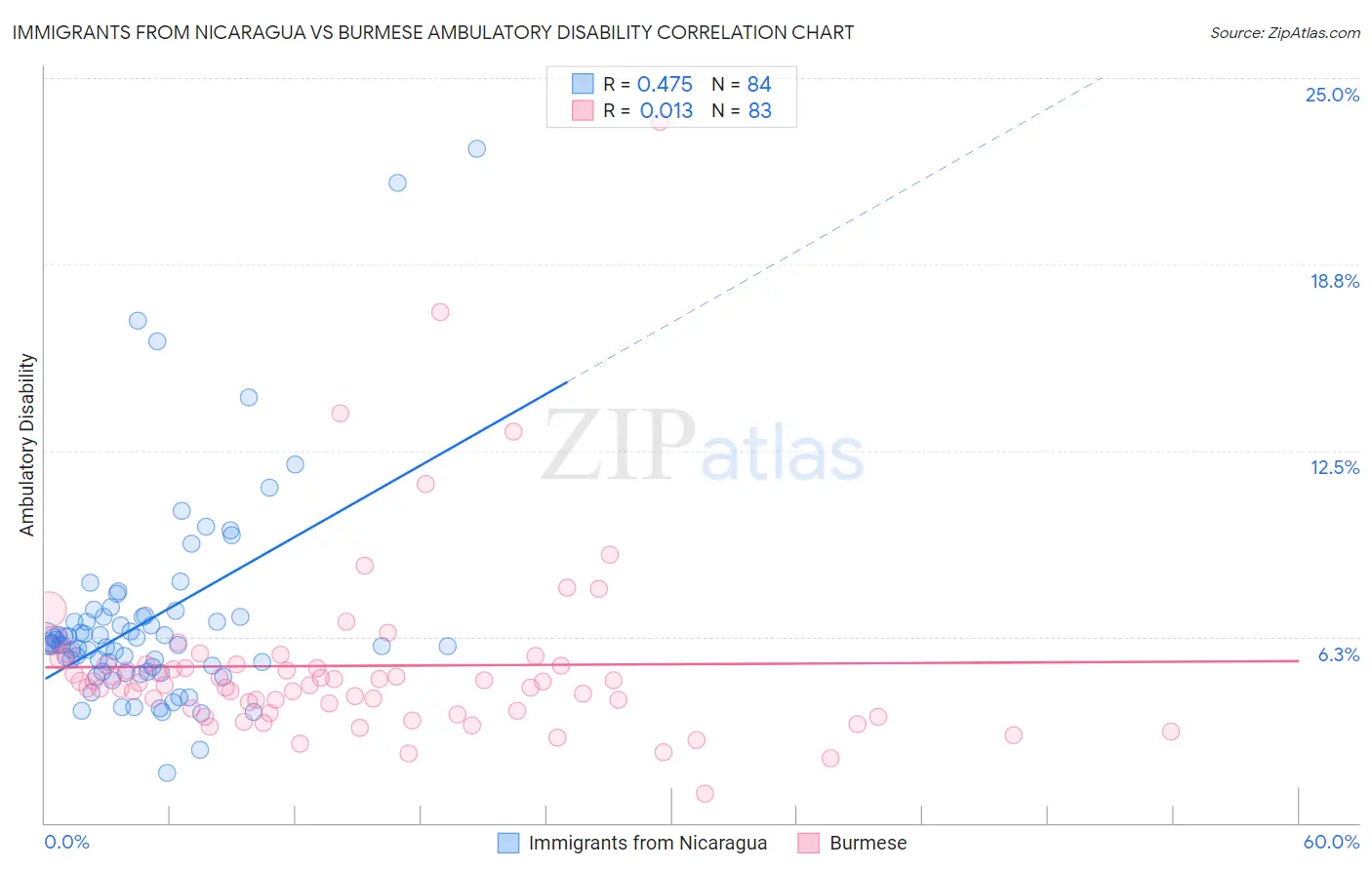Immigrants from Nicaragua vs Burmese Ambulatory Disability
COMPARE
Immigrants from Nicaragua
Burmese
Ambulatory Disability
Ambulatory Disability Comparison
Immigrants from Nicaragua
Burmese
6.1%
AMBULATORY DISABILITY
43.9/ 100
METRIC RATING
180th/ 347
METRIC RANK
5.3%
AMBULATORY DISABILITY
100.0/ 100
METRIC RATING
13th/ 347
METRIC RANK
Immigrants from Nicaragua vs Burmese Ambulatory Disability Correlation Chart
The statistical analysis conducted on geographies consisting of 236,322,252 people shows a moderate positive correlation between the proportion of Immigrants from Nicaragua and percentage of population with ambulatory disability in the United States with a correlation coefficient (R) of 0.475 and weighted average of 6.1%. Similarly, the statistical analysis conducted on geographies consisting of 465,101,003 people shows no correlation between the proportion of Burmese and percentage of population with ambulatory disability in the United States with a correlation coefficient (R) of 0.013 and weighted average of 5.3%, a difference of 16.2%.

Ambulatory Disability Correlation Summary
| Measurement | Immigrants from Nicaragua | Burmese |
| Minimum | 1.7% | 1.0% |
| Maximum | 22.6% | 23.5% |
| Range | 20.9% | 22.5% |
| Mean | 6.8% | 5.3% |
| Median | 6.0% | 4.7% |
| Interquartile 25% (IQ1) | 5.2% | 3.8% |
| Interquartile 75% (IQ3) | 6.9% | 5.3% |
| Interquartile Range (IQR) | 1.7% | 1.5% |
| Standard Deviation (Sample) | 3.5% | 3.2% |
| Standard Deviation (Population) | 3.5% | 3.2% |
Similar Demographics by Ambulatory Disability
Demographics Similar to Immigrants from Nicaragua by Ambulatory Disability
In terms of ambulatory disability, the demographic groups most similar to Immigrants from Nicaragua are Austrian (6.1%, a difference of 0.010%), Scandinavian (6.1%, a difference of 0.030%), Swiss (6.1%, a difference of 0.040%), Serbian (6.1%, a difference of 0.060%), and Immigrants from England (6.1%, a difference of 0.080%).
| Demographics | Rating | Rank | Ambulatory Disability |
| Croatians | 51.2 /100 | #173 | Average 6.1% |
| Immigrants | Canada | 50.0 /100 | #174 | Average 6.1% |
| Vietnamese | 47.2 /100 | #175 | Average 6.1% |
| Immigrants | North America | 45.6 /100 | #176 | Average 6.1% |
| Immigrants | England | 45.4 /100 | #177 | Average 6.1% |
| Scandinavians | 44.5 /100 | #178 | Average 6.1% |
| Austrians | 44.1 /100 | #179 | Average 6.1% |
| Immigrants | Nicaragua | 43.9 /100 | #180 | Average 6.1% |
| Swiss | 43.1 /100 | #181 | Average 6.1% |
| Serbians | 42.8 /100 | #182 | Average 6.1% |
| Immigrants | Thailand | 42.2 /100 | #183 | Average 6.1% |
| Immigrants | Ghana | 41.2 /100 | #184 | Average 6.1% |
| Immigrants | Bosnia and Herzegovina | 37.2 /100 | #185 | Fair 6.2% |
| Europeans | 36.2 /100 | #186 | Fair 6.2% |
| Carpatho Rusyns | 35.3 /100 | #187 | Fair 6.2% |
Demographics Similar to Burmese by Ambulatory Disability
In terms of ambulatory disability, the demographic groups most similar to Burmese are Immigrants from Eastern Asia (5.3%, a difference of 0.15%), Immigrants from China (5.3%, a difference of 0.48%), Okinawan (5.3%, a difference of 0.50%), Immigrants from Korea (5.2%, a difference of 0.81%), and Immigrants from Hong Kong (5.3%, a difference of 1.0%).
| Demographics | Rating | Rank | Ambulatory Disability |
| Immigrants | Bolivia | 100.0 /100 | #6 | Exceptional 5.0% |
| Bolivians | 100.0 /100 | #7 | Exceptional 5.1% |
| Immigrants | South Central Asia | 100.0 /100 | #8 | Exceptional 5.1% |
| Iranians | 100.0 /100 | #9 | Exceptional 5.1% |
| Yup'ik | 100.0 /100 | #10 | Exceptional 5.2% |
| Immigrants | Korea | 100.0 /100 | #11 | Exceptional 5.2% |
| Okinawans | 100.0 /100 | #12 | Exceptional 5.3% |
| Burmese | 100.0 /100 | #13 | Exceptional 5.3% |
| Immigrants | Eastern Asia | 100.0 /100 | #14 | Exceptional 5.3% |
| Immigrants | China | 100.0 /100 | #15 | Exceptional 5.3% |
| Immigrants | Hong Kong | 100.0 /100 | #16 | Exceptional 5.3% |
| Immigrants | Ethiopia | 100.0 /100 | #17 | Exceptional 5.4% |
| Immigrants | Sri Lanka | 100.0 /100 | #18 | Exceptional 5.4% |
| Indians (Asian) | 100.0 /100 | #19 | Exceptional 5.4% |
| Ethiopians | 100.0 /100 | #20 | Exceptional 5.4% |